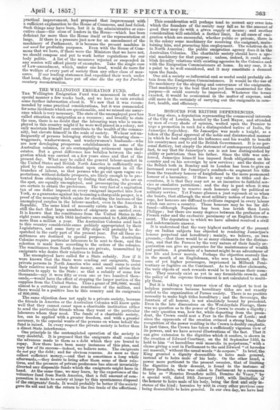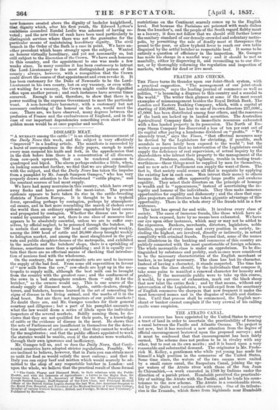HONOURS FOR BRITISH DEPENDENCIES.
NOT long since' a deputation representing the commeroial interests of the City of London, headed by the Lord Mayor, and attended by men of every shade of opinion, waited upon tho Premier to urge a promotion in rank for a distinguished native of India, Sir Jamsetjee Jeejeebhoy. Sir Jamsetjeo was made a knight, as a token of the Royal approval of the noble and disinterested manner in which he had employed his influence and his wealth to benefit his countrymen and to aid the British Government. It is no personal flattery, but simply the statement of contemporary historical fact, to say that Sir Jamsetjee's son is not less distinguished by ability or patriotism than his father. Since the title was conferred, jamsetjee himself has imposed fresh obligations on his country and on his sovereign by new services ; and the desire of the British both in Bombay and in London has been to give an increased reward for Jamsetjee's conduct—to augment his title from the transitory honour of knighthood to the more permanent honour of a baronetcy. If there is any value in titles and decorations, it is that they may act as an incentive to faithful service or emulative patriotism ; and the day is past when it was thought necessary to reserve such honours only for political or military service. Yet France glances a just reproach at us when she boasts, that although the most military nation of modern Europe, her honours are diffused to civilians engaged in every labour which can serve a country. Those honours may be too far diffused—although Napoleon has been less lavish than Louis Philippe ; but there are many degrees between the profusion of a French ruler and the exclusive parsimony of an English Government. The deputation to which we have alluded received a civil and indeterminate answer.
It is understood that the very highest authority of the present day on Indian subjects has objected to rendering Jamsetjee's honour perpetual and hereditary; mainly, we believe, on two grounds,—that there would be so many claimants for the distinction, and that the Parsecs by the very nature of their family organization can give no guarantee for the maintenance of wealth and position. A grandson of a baronet might be an adventurer of low life and lower morals. Perhaps the objection scarcely lies in the mouth of an Englishman, who sees a baronet, and the sons of yet higher personages, imprisoned in Milbank Penitentiary or fugitive on the Continent. As to the other claimants, the very objects of such rewards would be to increase their number. Tliey scarcely exist as yet in any formidable crowds, and the policy of the supreme Government is not calculated to multiply them. But it is taking a very narrow view of the subject to iest in helpless passiveness because hereditary titles are not exactly suited to the organization of Parsee society. There is no positive necessity to make high titles hereditary ; and the Sovereign, the fountain of all honour, is not absolutely bound by precedent. Even in the late discussions on the Wensleydale Peerage, there was no question as to the power of the Crown to create a dignity ; the only question was, how far, while departing from the precedent, the Crown could seat a Peer in the House of Lords ; and since the opponents of the creation evinced a strong bias, their recognition of the power residing in the Crown is doubly emphatic. In past times, the Crown has taken a sufficiently vigorous view of its powers, and we have several illustrations of the fact. That it can give extension to the dignities whioh it confers, is shown in the creation of Edward Courtney, on the 3d September 1553, to hold to him "et hteredibus suis masculis in rrpetuum," with a clause giving a seat in Parliament to the said Edward "et hteredes
sui me.souli," without the usual words "de oorpore." In brief, the
King granted a dignity deseendible to heirs male general, instead of to heirs male of his body. On the other hand, a power more pertinent to the present occasion, that of limiting the dignities in their descent, is found in the instance of Henry Bromilete, who was called to Parliament by a summons to him as " Henrico Bromfiete multi, Domino de Vescy," by a special writ, dated 24th January 1449, with limitation of the honour to heirs male of his body, being the first and only in
stance of the kind; baronies by writ in every other previous case being descendible to heirs general. In our own day, we have had new honours created above the dignity of bachelor knighthood, that dignity which, after his first youth, Sir Edward Lytton's ambitious scoundrel Randal Leslie was ashamed of having coveted; and the new titles of rank have been used particularly to distinguish services where there was not the guarantee for the particular means of maintaining hereditary dignity,. The civil branch in the Order of the Bath is a case in point. We have another precedent which bears strongly upon the subject. Wanted an honour virtually hereditary, and yet not necessarily so, but still subject to the discretion of the Crown. We have such honours in this country, and the appointment to one was made a few weeks since. In many counties it has been customary to intrust the LordLieutenancy to the most distinguished person of the county ; always, however, with a recognition that the Crown could divert the course of that appointment and even revoke it. It has been customary for the Duke of Newcastle to be the LordLieutenant in his own county, but on any vacancy, or even without waiting for a vacancy, the Crown might confer the dignified office upon another person ; and such instances have several times occurred. Enough is said, therefore, to show that there is a power residing in the supreme Government to meet the particular want. A non-hereditary baronetcy, with a customary but not necessary conferring of the honour on the son, would meet the case. There are, we have observed, many degrees between the profusion of France and the exclusiveness of England, and in the case of our important dependencies something even short of the golden mean would be at once popular and useful.



































 Previous page
Previous page